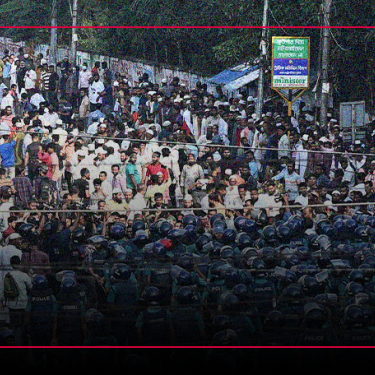Bangladeshi government asked to protect reporters after 30 are attacked during protest

Reporters Without Borders (RSF) calls on the Bangladeshi government to shed all possible light on the violence against around 30 reporters during a large opposition protest on 28 October in the capital, Dhaka. The authorities must guarantee the safety and protection of journalists in the run-up to next January’s general elections, RSF says.
Journalists were subjected to violence on an unprecedented scale while covering the banned demonstration on 28 October, which was called by opposition parties to press demands for Prime Minister Sheikh Hasina’s government to resign. Reporters were attacked by demonstrators, government supporters and police.
Some of the protesters beat reporters with bamboo sticks and steel bars or threw stones at them, although they were easily identifiable. At the same time, journalists were also deliberately targeted by police firing rubber bullets and teargas. Rioting protesters also vandalized vehicles bearing “press” signs and torched equally identifiable press motorcycles.
“The violence unleashed against journalists in Dhaka on 28 October was unacceptable. We call on the government and police to ensure the safety and protection of journalists, who play an essential role, especially in the run-up to elections
The media victims included Rafsan Jani, a reporter for the Dainik Kalbela daily newspaper, who had to be hospitalised after being beaten by protesters. Agence France-Presse video reporter Mohammad Ali Mazed was ambushed and then beaten over the head and on his back with sticks. According to the information gathered by RSF, both police and protesters grabbed equipment from Bangladeshi and foreign reporters, press photographers, cameramen and video reporters for online media.
In a related tragic incident, Rafique Bhuiyan, a retired journalist who was passing by the protest in a rickshaw, sustained serious head injuries when the impact of a teargas grenade fired by police caused his rickshaw to tip over. He died of his injuries in hospital the next day.
The demonstration – in which around 100,000 people participated, according to the police, and 1 million, according to the organisers – was called by the Bangladesh Nationalist Party (BNP), the leading opposition party, and by Jamaat-e-Islami, the country’s biggest Islamist party, to press demands for Prime Minister Hasina’s resignation so that a neutral caretaker government can oversee the elections due to be held in January.
